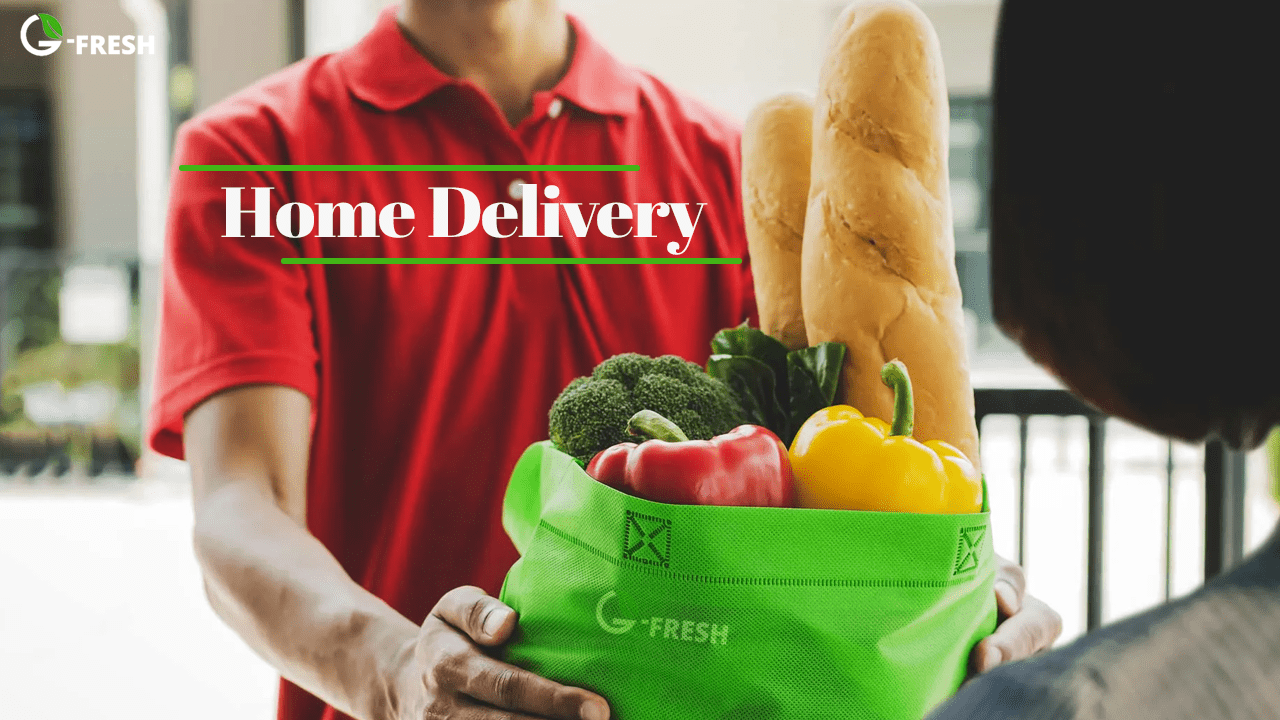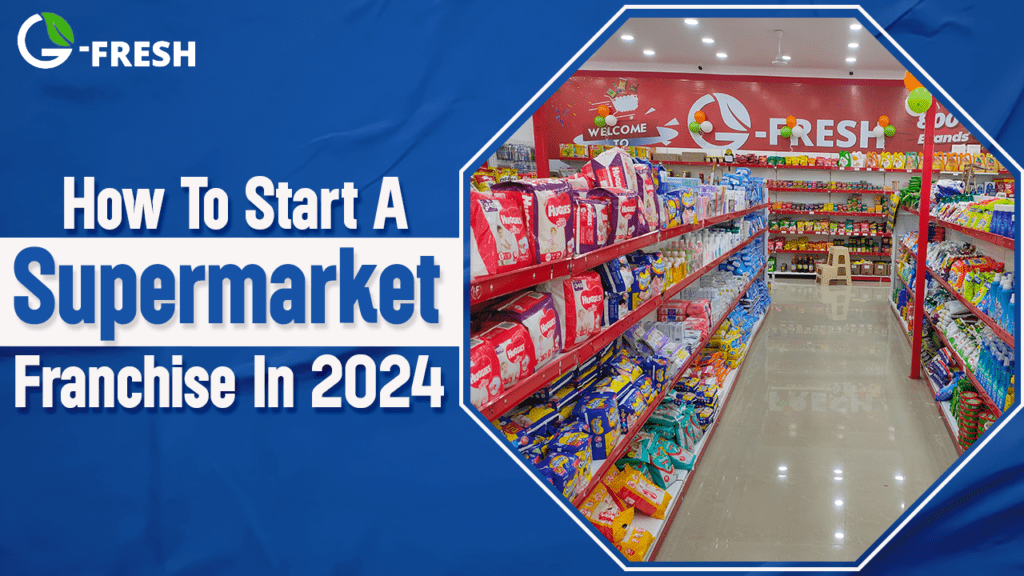The retail sector has always had its life and charm on its own. For ages, it has been the most dynamic sector of the Indian economy as it contributes to 10% of the GDP and 6% of the employment in the country. According to the estimates, the retail sector is going to grow at a rate of 10% over the next 10 years. So, there is going to be no time like the present to enter the sector of the supermarket and become a retail entrepreneur.
In India, where everything is based on culture and tradition, there is a certain charm being held by something tangible and when it comes to business, there is nothing more tangible than to start a supermarket franchise. Though, the supermarket e-commerce business is on a steady rise 90% of the sales are being generated in-store. The charm of the retail industry cannot be ignored in the field of business, and this is further forcing a long of e-commerce giants to open up their stores on-ground. Currently, the market scenario and predicted growth in the future makes the supermarket business an ideal choice to invest in and start your own business.
Well, when it comes to starting a business, no matter what industry you’re in, it’s never easy. The same goes with retail stores as they are no exception; between choosing the perfect location, and products, keeping track of the operations, and tons of other things, a few things may get left out while making the business a success.
If you are considering to venture into the Indian supermarket Industry and wish to get off to a good start then it is crucial to have a comprehensive business plan. The Indian market is highly competitive and understanding the dynamics of the industry is essential to ensure a profitable operation.
In this blog, we’ve covered the comprehensive requirements for opening a supermarket business in India which include a business plan, business registration, key licenses, documentation required, operational requirements, software applications, and staff management to run a successful supermarket business. With through research, we have created a successful roadmap that will serve as an outcome of the smooth operation of your supermarket business.
How to Start a Supermarket Business?
As an entrepreneur or a retailer, you must be wondering what are the steps to start your supermarket business in India. Well, in recent years, due to the business-friendly policies by the government it has become easier to start a supermarket franchise. With meticulous attention and the right steps, you can start up your supermarket business in the frictionless and fastest way.
Follow the steps below and start your own supermarket business in India.

1. Business Plan and Capital Requirement Checklist
It is imperative to determine the scale and size of the supermarket you are planning, the capital requirement, and financing options too. To make it easier, below are some of the key considerations you must consider.
- Define the scale and size of your supermarket.
- Check the financing options and capital requirements in every step of the planning.
- Decide the ownership structure whether it will be a partnership, sole proprietorship, private limited, etc.
- Get an estimate of the capital requirement on various aspects of the supermarket business.
- Identify the potential product offerings and brand partnerships.
- Setup costs should be calculated such as for renting, leasing the property, equipment purchase, and interior designs.
- Business setup costs including registration and license charges should also be calculated.
- Initial stock purchase costs from the vendors.
- Investment in technologies like billing counter, CCTV, and supermarket software.
- Marketing expenses such as flyers, print advertisements, and promotional events.

2. List of Documents and Government Formalities Required
Business Registration
To start up your supermarket venture, you may need to get a business registration. You can set up your business entity as a sole proprietorship, limited liability partnership, partnership, one-person company, or private limited company. The registration process is necessary as it gives the business legal recognition which is mandatory for a supermarket business. Not only this, but it also instills confidence in the customers.
Licenses
Securing up a shop and establishment license is essential when it comes to protecting the rights and interests of the supermarket’s workforce. The license regulates terms and the working conditions which ensures a safe and fair environment for the employees. Obtaining this license is a legal mandate for any of the retail businesses in India. It goes as follows:
- Shop Act license for regulating employee terms and work conditions.
- FSSAI License to ensure food safety.
- GST Registration for uniform taxation within the country
GST Registration
In case your supermarket turnover exceeds Rs 40 lakhs or 20 lakhs (Special states), then registering your business under GST is mandatory. The GST registration ensures that your business is following tax regulations in the eyes of the government. Supermarkets which are having different stores in different locations or branches may also be required to register for GST for each of the branches if you are working as an independent business entity.
Professional Tax Registration (PT)
Professional Tax Registration is a tax that is levied on the salary or income earned by employees as compensation for their services to the company. Well, this is a requirement for all self-employed individuals as well as for businesses. However, the amount of tax-totally depends on the rules which are set by a respective state. Some states do not mandate PT registration. Also, it is necessary to comply with the return filings and make the payment of professional tax based on monthly or annual returns.
Documentation Requirements:
There are various documents required to fulfill the legal prerequisites for opening the supermarket. The documents include:
- Aadhar Card: Proof of identity.
- Pan Card: For tax purposes.
- Photograph of the owner: A visual confirmation.
- Utility Bills: Recent water, electricity, or broadband bills of 3 months as proof of address.
- Bank Statement: To check the financial statements and viability.
- Incorporation Certificate: An essential document for the Private Limited Company registration.
- GST Registration certificate: confirmation compliance with the tax norms.

3. Finding a Location to Start A Supermarket Franchise
Picking up the right location for your supermarket business is essential as it guarantees that your supply will meet the neighborhoods effectively. Moreover, with a well-chosen location to start a supermarket franchise, you’ll enhance the convenience of your targeted customers while ensuring that the store caters to the community’s needs while bolstering long-term prosperity.
How to Choose the Best Locations for Your Supermarket Franchise?
When it comes to choosing the best location to start a supermarket franchise business in India, an owner has to do a lot of research while looking at the stores nearby, predicted footfall of the customers, and the area people live in. Moreover, parking facilities, and ease of entering the store also play an important factor in picking a location. To help you we have listed a brief analysis that will help you to choose a perfect location for your business.
Market Research and Analysis:
Picking up the right location for your supermarket business is essential as it guarantees that your supply will meet the neighborhoods effectively. Moreover, with a well-chosen location to start a supermarket franchise, you’ll enhance the convenience of your targeted customers while ensuring that the store caters to the community’s needs while bolstering long-term prosperity.
-
Demographics
Studying the parameters like population range, age groups, income levels, and consuming power gives key insights into the business. The demographics analysis helps the business to adapt to the products and tactics. With this, you can even boost the interactions with the customers to fulfill their requirements. This will also help in establishing a firm footing in the market by aligning what one may have to offer with the demographic and financial conditions of the audience.
-
Competitive Analysis
Analyzing the grocery stores in areas provides insightful information on the marketplace saturation and the possibilities. The evaluation gives a thorough hold on the competitive surroundings which helps in figuring out the underutilized niches and markets. With the help of this record, tactical alternatives can be chosen which will help in leveraging the unexplored markets that ensure a centered and informed approach in the supermarket industry.
-
Consumer Behaviour
Deciding upon the product services and marketing techniques is simply directed by the understanding of demands, buying capacity, and alternatives. Well, staying in tune checking the customer’s expectations and developing focused advertisements can help in choosing a perfect location. A supermarket should also adapt to the trends and key strategies accordingly to cater to different products and promotion strategies to match the needs of customers in a particular location.
Key Factors For Success: To Choose The Best Location For A Super Market Franchise
The factors: Cost, parking, traffic, regulations, infrastructure, community engagement, future development, and technology help in supporting long-term development. These factors also play an important role in regional requirements that create the ideal location to start a supermarket franchise.
A. Proximity to residential areas:
- Population density: Opening a supermarket close to the residential areas is important as you can take advantage of the larger customer base.
- Residential growth trends: Selecting residential development sites allows for long-term viability. Residential areas not only make it easier for the customers but also help the business for long-term success.
B. Accessibility and Visibility:
- Traffic patterns: Proper cross traffic makes a shop visible and provides easy access for the customers. Making sure that your supermarket is visible and accessible is one of the most important factors.
- Parking Facilities: More parking space is always more convenient for the customers which further helps in improving the efficiency and experience.
C. Competitor Analysis:
- Identifying and evaluating competitors: Comprehensive analysis of the competitors is needed which can further help in customizing the products.
- Differentiating factors for your store: Differentiating highlighters helps In highlighting the unique characteristics of the store which helps in making your store apart from the competitors.
Also Read: How To Start A Mini Supermarket Franchise?

4. Interior Design to Start A Supermarket Franchise
In the past, you might go to a supermarket without giving a thought to how their appearance may look thanks to the dull linoleum floors, beige shelves, and antiquated designs. But, in today’s market due to the cutthroat competition, having a great location, good product range, friendly staff, and affordable rate is insufficient. To excel in the market, you need to have an appealing supermarket interior design idea so that when a customer wakes up in the supermarket they get in awe. Below, look at some of the great supermarket interior design ideas and trends that will help you in designing your supermarket.
Well, for the time-pressed shoppers, a supermarket should offer more. Well, it is to encourage the visitors and to maintain up a great margin which can improve the customer happiness. Not only this, but a supermarket should also contain a branding, engaging message that is appropriate according to the design cues.
The Minimum Budget For Supermarket Interior Design
The budget will depend on the design and the materials you may be choosing and utilizing. For a rough idea, you can keep in mind a budget of say INR 1000 per sq. ft for a simple design with a budget material.
What Should Your Grocery Supermarket Interior Design Look Like?
Well, it takes long-term planning and independent thought to navigate the shifts of the customers while keeping them satisfied and the same goes with interior planning too. Below, we have listed some of the practical furniture arrangements that will help you in the long path to safeguard your business.
- Grid Design
The grid pattern is one of the most used and fundamental designs one can use while planning a supermarket. In this pattern, long paths are used which are laid out in a grid by aligning them parallel to one another on the straight line. This is one of the common and most used designs by retailers as it improves the effectiveness of the entire sale process
- Adequate aisle space
The aisles of the supermarket store should be wide enough so that you can invite customers to shop. The aisle space should be a minimum of four feet wide or more so that there is enough space to pass both ways for customers and so it does not create traffic.
- Shelf accessibility
Design the shelves according to easy access with a height of six feet from the ground. Well, 6 feet is the ideal height when it comes to planning the interior of a supermarket as customers can reach items without any difficulty.
- Position your checkout counter
Create a counter as per the shopper’s natural behavior by keeping it in the front-left of the store, as shoppers tend to enter from the right and move in a clockwise direction. Further, they exist on the left so you can add your counter to the left to make the checkout process even more convenient.
- Merchandising strategies
While designing you can place your bestsellers in the primary zones and you can use cross-merchandising to promote multiple purchases by keeping the impulse items such as chocolates, small toys, games, candies, and stationery products near the checkout counter as they will encourage more sales.
- Optimum space for fixtures and furniture
Make sure that the displays and fixtures of your supermarket can handle product weights and sizes which can ensure the safety of your products. This will also create a visual appeal in the shopping environment. In your interior, you can even add specialized racks for seasonal items which can capture shoppers’ attention and lead to increased sales, especially during the season time.
In addition, when it comes to planning interior design always make the best use of the available space which ensures high product availability and gives a quick shopping experience. The simplifications in the logistical components like adding supply shelves to manage numerous products add another great benefit by making it all easier.

5. Technology To Manage Operation Tasks In Supermarket
For any supermarket store, technology is quite essential for effective running. , technology can simplify any business complex task. Well, when it comes to managing operations, it is one of the complex tasks faced by the grocery business owners as they need to take care of the customers, inventory, payment options employees. Not only this, they also need to take care of the scaling opportunities to grow their business.
Well, the first technology needed is in the billing counters as it is one of the places in any supermarket which has the most rush and for that it should be functional so that it easy for the customers. Moreover, as a grocery store owner, there are many things to keep in mind until a customer comes into the store and returns, and managing each customer could be difficult too. Especially if there are multiple stores of one brand in different places.
For this, the point-of-sale system (POS) is introduced as it is a centralized platform that allows one to manage various business operations under one single dashboard. The Smart POS software is used in the system which automatically automates the functions and ensures the quality of service and security.
POS Conquers Supermarket Stores
Implementing a Point-of-sale system for supermarkets will change your supermarket game a lot and will also help in operating your business efficiently. Well, to meet your customer’s expectations you must offer tech solutions to them such as self-checkout, contactless payments, and contactless ordering which will bring a premium and unique customer experience to your store in India.
You also need to pay more attention in terms of technology so that your supermarket can survive in the competitive market. Not only this, it also allows you to grow and expand your business to different locations as well as online.
How POS Helps Your Store
Let’s dive in on how supermarket POS can help your business.
- Out of Stock Issue
When it comes to business, then it is essential to satisfy your customers as disappointed customers do not lead a business forward and it also affects the customer retention rate. Well, one of the negative experiences that happens in a business is because of the inefficient tracking of the inventory.
For example, when a customer places an order, and in a few minutes you check that the product is out of stock and when you notify the same to them it gives a negative experience to the customer.
By placing an effective POS for your supermarket store you can easily prevent these kinds of problems in real-time and that too without keeping a check on the inventory manually. The POS software automatically informs when a product is out of stock also when it is not. - Transaction Processing
POS helps a cashier to simplify the process of sales transactions without any hindrance. The POS software keeps the transaction clear, simple, and secure. It also allows to offer of various transaction methods such as cards, cash, and even other contactless payment options (Tap and Go method).
As a supermarket owner, you can even provide industry-leading payment partners to your customers which will give them an option to choose from different preferences according to them. The POS system also speeds up the process of checkout which gives premium experiences to the customers. POS also offers digital invoices which you can incorporate in your checkout process. You can even share the invoices with your customers through SMS, email, and WhatsApp which will make your checkout counter clean. - Manage Cash
Cash management is quite an essential system for helping business owners to run their businesses efficiently and to manage their finances. Well, every business is required to produce a cash flow to survive in the market and to meet the expenses of the running business. Manually managing the daily cash flow is quite a tough job and it is very prone to errors. With the help of POS, you can do this with 100% accuracy and easily. - Security
Security is one of the major concerns which is faced today in the digital age and when it comes to supermarket business data is very important. Here, POS software is coming to the rescue as it stores the data in a central location in which even if the data is hacked by someone or is stolen, you can fix it by logging out of the device and securing it. Moreover, in the supermarket business cash transactions could be stolen too which is recorded in the system, in here POS helps as well by making sure no cash fraud is registered and all the activities are recorded and given to the authorized personnel only. - Discounts and Promos
Promotional and discount activities are something which is getting a lot of hype in the business and when it comes to supermarkets it does help a lot. Well, giving discounts and promotions is only possible because customer information is stored in the POS system. With minimal time the system allows you to place discounts and promos.
POS Billing software has become an indispensable tool for supermarkets as it offers an easy checkout process, valuable customer insight, accurate inventory management, enhanced security, and seamless integration. By making the use of POS technology you can improve your supermarket’s operation efficiency, customer satisfaction, and business growth in today’s competitive retail space.

6. Staff Hiring and Training
Staff Hiring is one of the most essential things to start a supermarket franchise to build a workforce and create seamless operations. To manage the day-to-day activities in the supermarket you need the right candidate who can perform their responsibilities and roles properly. Well, if you are thinking about what types of requirements and staff you need in a store, below is a list of them.
- For the store cleaning, you require staff who can help with the maintenance and the cleaning of the store.
- You need several cashiers who can handle billing counters and can also help customers with questions about their bills and payments.
- The inventory control specialist is also necessary as they help in the in-inventory management to maintain the quality of the products.
- There must be a security guard too who can keep a check on the shopping receipts and can ensure the checkout details and products they are carrying are correct.
- A store requires a customer service representative too who can handle all the inquiries from the customers to get the right product.
- A store also requires a manager who can keep an eye out on all the operations and should ensure it’s going smoothly in the store related to staff, cleaning, customer service, inventory, and everything else.
Well, it’s fair to say that a supermarket’s success is related to the staff and how skilled, dedicated and trained the employees are.
Know How to Hire Employees: Hiring Tactics and Training Practices
- Define the Job Roles Clearly
Start by creating a defined job description for each role you might be looking to fill in your supermarket. You should clearly outline the responsibilities, qualifications, skill requirements, and expectations of the employee. Moreover, be very specific on the role’s contribution to making the store a success. - Craft Compelling Job Ads
You need to write engaging and informative job advertisements which can highlight the benefits of working in your store. It’s important to clearly state what makes your business apart from others and why the candidates should be excited to join your business. - Leverage Online Job Platforms
Post the job postings on the online platforms, on the company’s website, on social media platforms, and job boards. These platforms will help you to find the right candidate and can help you gather a list of audience too. - Use Employee Referrals
You should encourage your current employees so that they can refer potential candidates for the job role. As employee referrals can lead to high-quality hires who fit well within the working culture of the supermarket. - Screen Resumes and Applications
Next, carefully review the applications to shortlist the candidates based on their skills matching up with your role. - Conduct Structured Interviews
Conduct a well-structured interview process which includes a mix of situational, behavioral, and skill-based questions. This will help you to assess a candidate’s customer service skills, and problem-solving abilities and will also help you to find the right staff for your supermarket business. - Consider Team Dynamics
While taking the interview, evaluate your candidate’s alignment with your customer service approach, store’s values, and team dynamics. A candidate who fits well into the ethics is more likely to contribute positively in a supermarket. - Test Customer Service Skills
Since supermarket involves direct customer interactions, considering a test on the candidate’s communication, customer service skills and sales abilities is essential. - Offer Competitive Compensation
Providing competitive compensation is necessary by researching an average salary for retail roles in your area. By offering the right compensation you can attract top talents in managerial roles. You can also include store offers, employee discounts, and advancement opportunities. - Provide Growth Opportunities
You should highlight career growth paths within your business. Here, candidates are more likely to be interested in a position that offers skill and advancement development. - Onboarding and Training
Once you have selected your employees according to the roles in your supermarket, next ensure a smooth onboarding process. Provide them with comprehensive training to familiarize them with the store’s products, policies, customer service expectations, and services. - Emphasize Team Collaboration
During the process of onboarding, emphasize the importance of collaboration and teamwork. Build a positive team dynamic to make the supermarket’s environment enjoyable during work for the employees.

7. Budgeting and Financial Planning
Planning an effective budget and fiancé is one of the crucial components of sustaining and launching a successful supermarket business. Careful financial management also helps you to meet your operational expenses, adapt to the changes in the market, and also helps one to achieve your goals.
Start-Up Costs & Operating Expenses
Before the opening of the supermarket, you will have to determine the initial start-up cost of your business. This typically includes expenses like store design, securing a location, purchasing the shelves and equipment, construction, obtaining the licenses, hiring, and training staff, and inventory acquisition. An understanding and calculation of the costs are essential so that your business can secure the necessary capital to launch your business. This typically includes the mortgage, rent, employee salary, marketing, utilities, insurance, maintenance, and inventory purchases. Creating a detailed budget is essential on a monthly or yearly basis to maintain financial stability in the market.
Revenue Projections & Cash Flow Management
Your revenue projections are based on your market research and pricing strategies. Estimate your sales based on factors such as customer volume, average transaction value, and seasonal variations. Realistic revenue projections are essential for tracking your progress and determining whether your supermarket is on track to meet its financial goals. Effective cash flow management is vital to ensure that your supermarket always has enough liquidity to cover expenses, especially during slower sales periods. Monitor your cash flow regularly and plan for contingencies to avoid potential cash shortages that could disrupt your operations.
Monitoring and Adjusting
It is also important to regularly monitor your financial and budget performance so that you can check whether you are on track or not. In case you find that your expense or revenue is getting deviated significantly from your projections then it is important to be prepared to make the adjustments according to your budget and financial plan. When it comes to supermarkets, flexibility is the key, and adapting to changing marketing conditions is also important for a healthy financial position.
The market can change anytime and the customer’s choices too by bringing in unexpected challenges. For this, it is crucial to have contingency plans to address potential financial setbacks such as increased competition, sudden drop in sales, or the unexpected costs of the repairs. A well-planned thought could take you through the challenging times by helping you safeguard your financial stability in the supermarket business.

Branding And Marketing Strategies
Creating a strong branding and marketing strategy is not just a choice, but it is a must for a supermarket business to survive in the retail space. With the use of smart strategies like customer focus, consistent branding, and marketing, determining unique selling points, and quality assurance and by connecting with the customers you can excel in the market. In India, as supermarkets compete for attention effective marketing is the key to success and profitability in the retail world. Now, let’s take a look at the branding and marketing strategies to help you to start a supermarket franchise and to stand out in the crowd.
- Consistent Branding
Make sure that your supermarket branding is consistent across all the points, from online platforms to the store’s physical appearance. Consistency in maintaining that branding fosters recognition and mouthword marketing too. - Customer-Centric Approach
Prioritize your customer’s preferences and needs by tailoring up your branding to reflect what your target audience resonates with. - Quality Assurance
Emphasize the freshness and quality of your products by building a reputation for excellence and reliability. - Community Engagement
For effective marketing engage with the local community through the channels of sponsorships, events, and initiatives. - Digital Presence
You can up the scale of your marketing by leveraging the power of online presence through social media profiles and websites. You can share content that educates and engages the customers hence this will add more customer base. - Customer Feedback
Act and encourage getting customer feedback to improve your supermarket’s services for the customers. - Unique Selling Proposition (USP)
Promote and identify what sets your supermarket apart from others. Either it could be selling exclusive products, superior service, or competitive prices. - Loyalty Programs
Add a loyalty program to reward your shoppers with exclusive deals and discounts which will further encourage repeat business. - In-store Promotions
Host in-store promotions regularly such as offering buy-one gets one free offers, and discounted combos to attract footfall and even to boost up the sales. - Social Media Contests
Run engaging contests on online platforms that encourage customers to share their photos, experiences, or product recommendations that further give them a chance to win prizes or bonus amounts. - Personalized Marketing
Get the data of your customers and send them targeted promotions, personalized recommendations, and exclusive offers by enhancing their shopping experience and building a community of permanent customers. - Cross Promotions
Partner with other local businesses to offer cross-promotions by creating mutually beneficial deals that expand your customer base. - Product Sampling
Offer tastings and free product samples in-store while introducing new items to create a positive buzz. Further, this will entice customers to make additional purchases too. - Local SEO Optimization
Optimize your online presence for the searches which is done locally by ensuring that accurate business information is provided on platforms like Google My Business which will help customers to find your business easily. - Mobile Marketing
It is essential to utilize SMS marketing and push notifications as a marketing strategy to send timely discounts, promotions, and daily updates to your customers on their mobile devices.

9. Improve Shopping Experience By Introducing Loyalty Strategy Programs
Adding a loyalty program in your supermarket is quite a strategic initiative to stimulate customer engagement. Loyalty programs also encourage repeat visits, increased spending, and shopping loyalty of the customers. With such schemes, loyalty members can have access to daily/weekly deals, discounts, and other rewards depending on their spending at the grocery store. By offering such rewards, a supermarket can create a positive shopping experience that encourages repeated visits and strengthens the loyalty of the brand.
A grocery store loyalty program also provides valuable information about the customer’s preferences and behavior which further allows the supermarket to refine its marketing strategies to meet the customer’s needs in different segments. Generally, loyalty programs do create an effective marketing strategy hence serving a win-win solution both for the retailers and customers.
Essential Components of Effective Loyalty Programs in Supermarkets
Take a closer look at the best loyalty program in the supermarket.
- User-friendly platform: A loyalty program should have a simple and intuitive interface. Whether it’s a website, mobile app, or a physical loyalty card the interface should be friendly and easy to understand and use.
- Personalization: Offer customers rewards that can match their shopping habits and preferences and can also motivate them to come back to the store.
- Permanent reward systems: Customers should know how to save up their money to receive exclusive discounts, rewards, and special offers.
- Valuable Offers: You should offer valuable offers to customers that can encourage them to participate in the supermarket reward program whether it is exclusive deals, discounts, or free products.
- Data Analysis: Analysing and collecting customer data helps to understand the behavior of the customers which allows to conduct of targeted marketing campaigns and further helps in providing personalized offers too.
- Communication: Regularly informing about the new promotions and informing the participants about the programs can benefit attracting new customers too.
- Customer Feedback: Getting customer feedback provides an opportunity to help and improve the program by taking wishes and suggestions into consideration.
With the combination of these components, you can develop a loyalty strategy that will effectively improve the sales and shopping experience of your customers.

10. Finding Vendor & Distributors
You should know what your supermarket requires before approaching any vendor or distributor for product filling in your supermarket. Groceries, farm produce, dairy products, frozen foods, beverages, snacks, and household equipment among others should be included in this list. Understanding what you have in stock helps in finding out who can supply it to you.
Do not use only one method when looking through different channels that may help identify potential sellers or distributors. You may decide to look for local suppliers or even go beyond international borders, depending on what works for you best. Trade fairs could be some of the places to meet grocery product sellers, while industry events and networking meetings may not be missed from your calendar. Additionally, consider online platforms or directories with specific grocery supplier lists.
Find out whether each considered vendor/distributor has good standing within their area of operation. It would be better if there were many instances where they proved faithful by delivering quality goods within agreed time frames. Verify their legitimacy based on client reviews/testimonials as well as organization certification.
Take advantage of associations related to your line of business or trade forums where recommendations about reliable suppliers can be given out freely. Ask other store owners/franchisees who might recommend some trustworthy vendors they dealt with before.
Reach them after listing down those potential distributors; inform them about what interests you. State clearly everything expected like price ranges, and delivery dates alongside partnership plans but most importantly specify which samples should come from whom as this could guide the right decision-making process also request brochures showing product details if necessary.
Discuss with suppliers while keeping in mind that whatever is agreed upon should favor both parties involved since it’s still a win-win situation. Though negotiating might seem like losing out, remember that this has to benefit your supermarket franchise. This involves talking about pricing, minimum quantities for orders, payment arrangements, and even delivery programs, among other factors. You need an agreement that will see both parties grow together.
Where applicable visit such listed supplier’s premises so as to practically judge how they operate. Ask if they have storage space and distribution network as well as find out hygiene control measures plus quality assurance procedures done at their place of work or warehouse. This will help you understand the way in which a given supplier keeps stock records and handles logistics.
Give priority to those who follow industry standards and comply with regulatory requirements. Products should meet safety regulations, especially for perishables like fruits or milk, which are consumed directly by humans. Set clear criteria for product quality so that it meets customer satisfaction levels consistently.
Begin signing formal contract papers immediately after identifying potential vendors/distributors. Clarify every term, including cost implications during the shipment period taken returning goods back or even dispute settlement mechanisms put in place towards tailoring open channels where any matter can be easily addressed during our partnership with them.
However, in 2024, it can get difficult to start a supermarket franchise, if you are not good at doing business with producers who can be trusted, let alone becoming successful. It does guarantee other terms are fulfilled, provided that there is regular supply only, but it also builds trust between parties involved.

11. Dealing with Distributors for High Margins
When starting a supermarket franchise, one of the key elements is the management of good relations with distributors for high revenue. Here is how you can maximize margins by dealing with your distributors.
- Research and Select Reliable Distributors
The first step involves researching and identifying distributors capable of supplying quality products at competitive prices. Look for suppliers that have a reputation for being on time, reliable, and delivering high-quality goods. Attend trade shows or network at industry conferences where people in the food business meet – these are events where potential suppliers might be found. - Negotiate Competitive Pricing
Reaching an understanding of pricing is important to keep profit margins healthy. Begin by asking different suppliers for quotations on items you want to sell from your store. Use these quotes to leverage better pricing during negotiations when you start a supermarket franchise. You can also hint at how much business your supermarket franchise will bring, which could lead to discounts or lenient terms being given. - Establish Clear Terms and Conditions
Ensure all contracts with distributors are put down in writing and include clear terms as well as conditions. Write everything down about signing agreements regarding prices, payment periods, delivery dates, etc., while giving rules concerning returns after sales have already been made, among others. Open communication should be encouraged so that there are no disputes later between the parties involved. - Build Long-Term Relationships
Try to build long-lasting relationships with your suppliers over time since this may make them lower their prices sometimes due to the large quantities they expect from you among other advantages. Keep channels open plus solve problems quickly so that everything remains smooth throughout the partnership period. - Monitor Market Trends
Knowing market trends plus what customers like would help one forecast demand for certain goods, hence negotiating better terms with sellers by ordering more, especially where such items are few but highly demanded. Being proactive to these changes in our markets leads to more money, therefore directly affecting our net sales figures. - Implement Efficient Inventory Management
Efficient inventory management is key to maximizing margins. Analyse sales data so as to know which products move quickly and those that move slowly. Collaborate with suppliers in adjusting stock levels that will ensure no overstocking occurs which can bring about holding costs when you start a supermarket franchise. Optimise inventory turnover rate which would enhance cash flow as well as profitability. - Leverage Technology for Ordering and Tracking
Use technology to streamline the order process and track deliveries made. Introduce an inventory control system that aligns with the distributor’s system, thus making it easy for one to place an order or track delivery status. Automated systems minimize errors while optimizing inventories, thereby cutting down costs. - Negotiate Marketing Support
Aside from that, talk about marketing support as well as product supply coming from sellers. This may include co-op advertising, promotional materials, or even joint marketing campaigns. Use what your vendor provides so that more people can learn about your products, which will lead to many purchases and, consequently, higher profits. - Evaluate Supplier Performance Regularly
Review supplier performance periodically such as looking at product quality, delivery accuracy, or customer service level among others. Always give positive feedback on any issue immediately for them to maintain high standards throughout their operation period. Grow your supplier base wider strategically in order to mitigate potential risk while capitalizing on available opportunities. - Compliance with Regulations
Abide by all rules regarding sources, storage, and handling of products that might be legally binding like those governing food safety measures, labeling requirements, import/export restrictions etc. Otherwise, you will incur fines and suffer reputational damage due to non-compliance thus dragging down business growth in any organization system.

12. Home Delivery
Operational efficiency can be significantly improved by adopting a home delivery system. When orders are made online, the number of in-store shoppers decreases; this allows staff to focus on other tasks, such as restocking shelves or providing customer service. In addition, the time spent queuing at checkouts is eliminated since customers pay for their goods through electronic transactions before they arrive for collection. This type of service also minimizes errors that occur during manual inventory management while reducing costs associated with wasted labor hours caused by overstaffing during periods when there are fewer walk-in shoppers.
Setting up a home delivery service may require training and operational changes, however, it can improve efficiency in the long run. Modern technology helps streamline distribution through route optimization while logistics solutions cut costs during deliveries thus enhancing customer service levels. In this manner, the franchisor can remain price competitive and achieve higher earnings on well-optimized operations.
Data Insights and Customer Engagement
Any franchiser who implements home delivery opens avenues for data collection and improved customer involvement. Such transaction details provide useful information about buyer preferences and purchasing trends vis-à-vis geographical distribution for marketing use in targeted adverts, among other things like inventory management decisions, leading to better communication strategies with clients and, hence, increased loyalty rates.
Sustainability & Environmental Impact
To save sustainable costs by optimizing delivery routes and reducing individual trips made to the store, one should think of adopting home delivery when you start a supermarket franchise. Carbon emissions related to transportation can be minimized when different orders are combined into efficient routes, as well as promoting packaging that is friendly to the environment, which could see more use of reusable bags by eco-conscious customers, considering this will also align with the brand’s commitment towards sustainability.
It is not just about an online purchase being sent right away after paying for it; there is more than meets WhatsApp status updates! You will receive an email notification once your order is received at either the shop or warehouse where it was placed so that they can start processing it; while goods go out for delivery, you get an SMS alert. This means that if somebody loads your parcel, then expect a message from companies like DHL, UPS, or FedEx indicating the approximate time of arrival therefore as soon as it lands at the destination point.

13. Watch and Manage Wastage
Monitoring wastage effectively can lead to huge savings, thus contributing greatly towards the overall success of any given franchise.
Inventory Management Systems
Waste control is what advanced inventory management systems invest in. Utilize technology in enabling real time tracking of stock levels which would help establish demand patterns best suited for keeping optimal amounts within range at all times. These kinds of automated systems also incorporate alerts on nearing expiry dates or slow-moving items that might require discounts so as to minimize wastage.
Demand Forecasting
Accurate demand forecasting is vital in preventing under-stocking and overstocking of goods. Use historical sales data, seasonal trends, and market intelligence to come up with accurate sales flow projections using these tools more efficiently. This will ensure closer stocking levels against known quantities sold, thus cutting down unnecessary inventory that would otherwise end up as waste products.
Supplier Relationships
Maintaining strong ties with suppliers ensures timely delivery. It may be necessary to negotiate with them for flexible terms, allowing order changes in real-time. Create open lines of communication for a smooth procurement process toward lean operations without unnecessary stockpiling.
Introducing FIFO and FEFO Practices
To ensure good housekeeping of stocks, you can apply First In First Out (FIFO) and First Expiry First Out (FEFO) principles. This means that older products should be sold or used before new ones so as to minimize waste caused by expiry. Correctly labeling the goods with their expiry dates and rotating them will greatly reduce the chances of spoilage.
Donations and Recycling Programs
Another approach is to partner with local charities or food banks where excess but still edible foodstuffs could be donated. Additionally, there should be systems put in place for recycling packaging materials as well as any other recyclable wastes generated within the supermarket environment itself. This way, not only will you help reduce waste but also contribute towards social welfare and sustainability by diverting some products and materials from ending up in landfills.
Continuous Improvement Culture
Franchisees should create a culture of continuous improvement in which they continuously get feedback from their customers and stakeholders when they start a supermarket franchise. Therefore, the company should remain updated on industry trends and best practices regarding waste reduction measures. Sharing ideas with other franchisees or experts in the field could further improve your waste management strategies.
By implementing these full-range approaches and entrenching a waste-conscious mindset throughout your supermarket franchise, you are likely to achieve minimal wastage, increased operational efficiency, and growth that is sustainable.
Conclusion
To Start a supermarket franchise in India it requires consideration of financial, legal, and operational aspects. The above list provided in this article will help the aspiring business to navigate the supermarket industry. Through optimal productivity, customer satisfaction, and leveraging technology like POS you can improve your supermarket business However, you may have various other alternatives to pick from and you should select the best one. Also, keep in mind that “There is no business without risk”. To summarize by following and adapting to the ever-changing dynamics, you can establish a supermarket business in India successfully.
Frequently Asked Questions
What Is A Supermarket Store?
A supermarket is a retail establishment which primarily sells the food and other household products for the consumers. It is basically a place where you can get wide range of day-to-day items including dairy products, fresh produce, packaged goods, poultry and meat, household supplies, beverages, personal care items and even non- food items. In addition, supermarket also sells variety of other food products and additional services like ready to eat meals, bakery items, deli counters and pharmacy products too. Some supermarket stores also have expanded their offerings which includes clothing, household goods, electronics and other consumer products which can meet the customer day to day shopping experience.
Do I Need Any Specific Qualifications Or Experience To Start A Grocery Store?
When it comes to starting a supermarket store it is not mandatory to any specific qualification. But, having a certain knowledge about the supermarket industry is important. Moreover, having an understanding on giving good customer service and knowledge on inventory management is important too. Previous experience on retail or supermarket store operations can even add an advantage too.
How Can I Attract Customers To My Supermarket Store?
To attract customers, focus on delivering an amazing shopping experience which can be offered by providing a wide range of products in competitive pricing, cleanliness in the store and ease of convenience and personalised customer service. Implementing effective marketing strategy is an add on too as it creates awareness and attracts customers by doing promotions, local advertising, and word of mouth referrals.
How Can I Ensure The Freshness And Quality Of Perishable Products?
It is important to establish a strong relationship with the wholesalers and reliable suppliers who can provide quality and fresh products to you. Implementing proper storage and refrigeration facilities can help in keeping the products fresh. It is also important to adhere to the hygiene practices by keeping a check on the expiry dates of the products and the condition of the perishable items.
What Are The Trends In The Grocery Retail Industry?
Some of the emerging trends in the supermarket industry include online shopping which has increased the demand of healthy and organic food products, personalized shopping experience and has also adopted the digital payment options. It is important to be in the supermarket business to stay in tune with the industry trends that cater to evolving customer experience. Starting a supermarket store does require careful planning and efficient operations. By offering good service and efficient service you can create a pleasant shopping environment and establish a supermarket in India.
